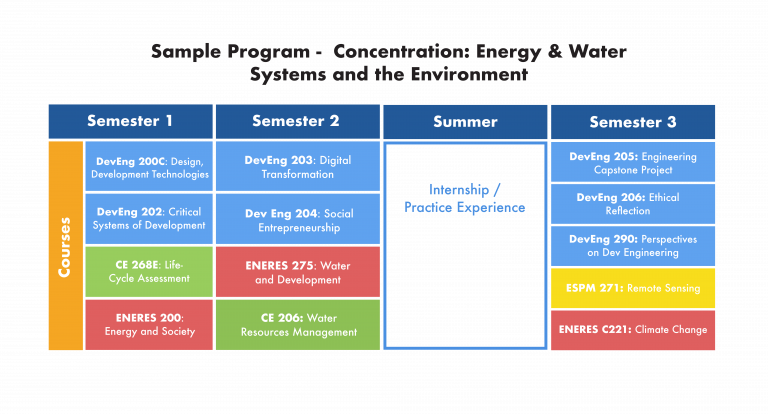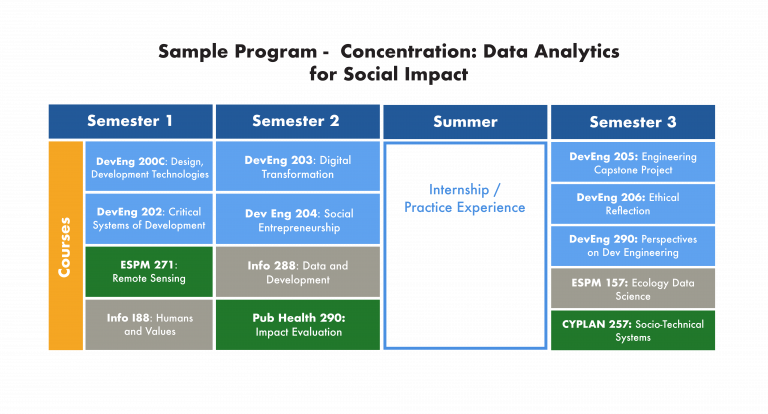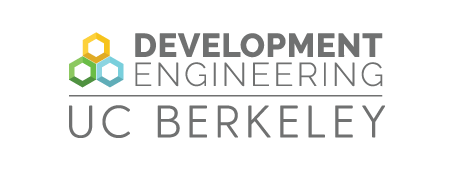Required Courses
First Fall Semester
DevEng C200: Design Evaluate & Scale Development Technologies: The course provides project-based learning experience in the development of human-centered products, services, or systems. The course teaches the mindsets, skill sets, and toolsets of design thinking with a focus on its use in development. The course is focused around the following modules that cover core phases of the design process: observe and notice, frame and reframe, imagine and design, and make and experiment. Students will also learn the theory of change and methods for assessing potential impact of technology interventions. Students will be expected to learn ethnographic interviewing, webs of abstraction, ideation, and basics of both hardware and software prototyping. The course will engage social impact designers from industry as speakers and coaches.
DevEng 202: Critical Systems of Development: This course is intended to provide students in the Master of Development Engineering with the necessary background and knowledge to undertake projects and work experience of a global scope. Students will be exposed to a diversity of methodological frameworks, introduced to the skills needed to effectively participate in the sustainable development field (such as systems mapping and landscape analysis), and to understand the history and ethics of global development. Students will be required to complete an annotated bibliography and a systems analysis of a problem of interest.
Two electives are required in addition to the above courses.
Spring Semester
DevEng 203: Digital Transformation of Development: As technology use proliferates globally, there exists significant potential leverage to further understand and improve the lives and livelihoods of people in low-resource settings. Through a careful reading of recent research and through hands-on analysis of large-scale datasets, this course introduces students to the opportunities and challenges for data-intensive approaches to development. Students should be prepared to dissect, discuss, and replicate academic publications from several fields, including development economics, machine learning, information science, and computational social science. Students also will conduct original statistical and computational analysis of real-world data. They will gain an introduction to sensors as well as tools and methods for spatial modeling and spatial data analysis.
DevEng 204: Introduction to Social Entrepreneurship: Social entrepreneurship entails market-oriented approaches to address social problems for sustainable, scalable outcomes. This course will enable students to frame complex problems and devise entrepreneurial approaches for addressing them. Students study the dynamics of societal challenges and the conceptual framework of social innovation and social entrepreneurship from theoretical and practical perspectives. Students also explore technology solutions to address global social problems with a systems thinking approach. Students additionally learn how to develop appropriate business models and implementation strategies for a social venture. Student projects will integrate the development engineering goals of creating technology interventions designed to improve human and economic development in complex low-resource settings. This course is the first of a sequence of two final project courses for candidates of the Master of Development Engineering.
Two electives are required in addition to the above courses.
Second (and last) Fall Semester
DevEng 205: Development Engineering Applications: This course is the second of a sequence of two final project courses for candidates of the Master of Development Engineering. Students engage in professionally oriented independent or group projects under the supervision of an advisor. The projects integrate the development engineering goals of creating technology interventions designed to improve human and economic development within complex low-resource settings.
DevEng 206: Ethical Reflection and Portfolio Building (2 units): This course is intended to provide students with a forum for reflection on the Summer Internship component of the Master of Development Engineering as well as projects worked on to date. Topics covered by the course will include issues of power and privilege, civic engagement, political/public policy contexts, tensions between tourism vs. travel, and community service vs. engagement. Students will discuss and produce an op-ed on an issue of interest. Students will also develop a portfolio to capture their individual point of view and skill sets developed in the M.DevEng.
DevEng 290: Perspectives on Development Engineering (1 unit): Development Engineering represents a new interdisciplinary field that integrates engineering, economics, business, natural resource development, and social sciences to develop, implement, and evaluate new technological interventions that address the needs of people living in poverty in developing regions and low-income areas of the United States. This seminar, offered once per year, will feature guest lecturers with insightful perspectives on the emergent field. The DevEng 290 series covers current topics of research interest in development engineering. The course content may vary from semester to semester. All topics will address the development engineering goals of developing technology interventions designed to improve human and economic development within complex, low resource settings.
Two electives are required in addition to the above courses.



